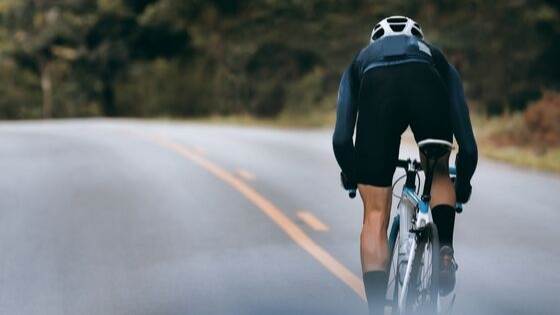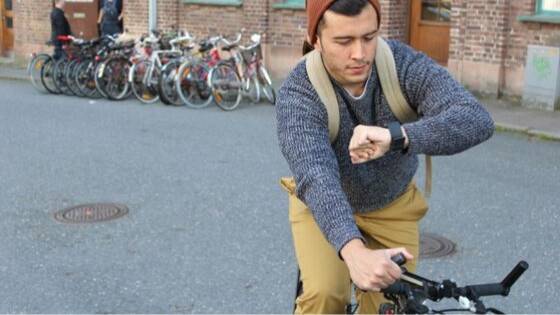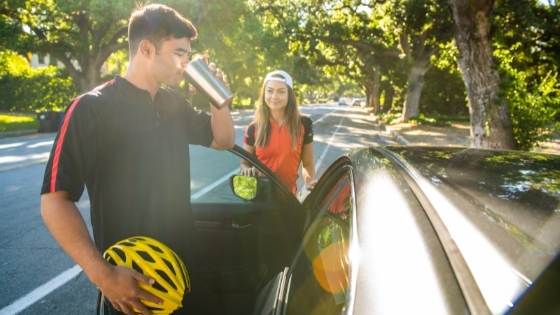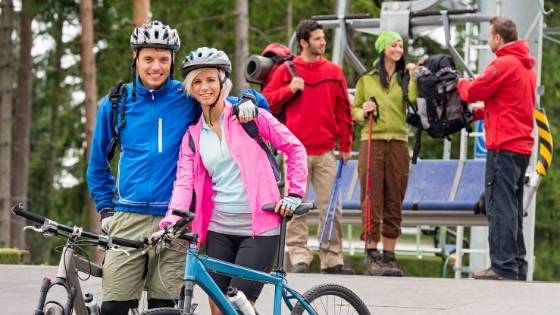Intermittent fasting is fast becoming a serious weight management programmes with thousands of people trying out the technique.
The result shows many people have had the desired success, and it might be time for cyclists to start thinking about the diet.
The success for cyclists will need to be studied, but I consider intermittent fasting has great weight management benefits and it can improve your performance on the bike.
Here you will find everything you need to know to get started with intermittent fasting.
Intermittent fasting can work really well for cyclists because it creates a calorie deficit before exercise. Generally, most cyclists who use intermittent fasting lose between 7 – 10 pounds of body weight in 12 weeks. Therefore intermittent fasting can be a perfect diet for all cyclists.
The best thing is intermittent fasting is easy to get started. Now the caveat is there are some complexities you will need to pay attention to; however, they will be detailed in this blog.
Table of Contents
What Is Intermittent Fasting?
Simply putting it intermittent fasting isn’t a diet, intermittent fasting is a meal timing plan. You are focusing on a specific period in which you are withholding from calories (fasting), followed by consuming your calories (feeding). The problem people make with fasting they overthink it. It’s best to keep it manageable and in keeping with your lifestyle.

What Are The Benefits Of Intermittent Fasting For Cyclist?
Physical Benefits
There are substantial physical benefits, and that is the main reason why people are attracted to intermittent fasting. Physical advantages can be dramatic fat loss while maintaining muscle and increasing muscle tone and power, which will benefit your cycling.
It can also enhance your skin, nails, hair and many other things because of the nutrient uptake that occurs following the fasted period.
You have these physiological currencies that happen because of the release of Adrenaline, Epinephrine and Norepinephrine, which allows your body to tap into fat stores and preserve muscle.
Mental Benefits
Mental benefits begin to appear when you are on a fasting protocol over an extended period, and your brain goes into survival mode.
It might sound bad, but it’s actually great because what’s happening is when your mind becomes hypersensitive and very focused.
It turns this way because it preserves the energy and focuses on the task at hand. Instead of having all those extra thoughts, you can focus on an individual task without distraction.
Time off the bike to focus on your mind can help improve performance, especially during tough rides.
Cellular Benefits
When you’re fasting autophagy begins to happen. Autophagy is when your cells get eating up by new cells and consolidate into powerful, efficient cells.
Therefore making your skin look better, live longer and improves all kinds of organ function.
How To Start Intermittent Fasting For Cyclists?
I don’t mean how do you start fasting, that part is pretty simple, you stop eating, and your fast has begun. However, what you eat leading up to fasting is essential. If you pick something high in fibre, you will be a lot fuller before starting your fast.
If you’re going to be fasting from 10 pm the night before until 2 pm the next day at 10 pm, you may want to have something with fibre.
It’s letting you stay satiated for an extended duration. You still get all the metabolic advantage of fasting, but as far as your hunger is concerned, you’re not going to get a rumbling stomach.
I would recommend having some fats they digest slower. They’re going to leak-free fatty acids into your bloodstream, so you’re able to produce ketone bodies, necessary for fat loss.

How Long Should You Fast?
When you’re fasting the benefits, you are trying to achieve usually dictated by the length of the fast. Meaning the shorter the fast you will get body composition effects. Although, the longer you fast, the more you will tap into cellular rejuvenation effects.
To get started I would advise a 16 hour fast this is called 16-8 intermittent fast, which suggests you fasting for 16-hours, followed by an 8-hour eating window.
Most of us don’t stay awake for 24 hours, so some of your fasting is during sleep.
16 hours is the minimum amount of time you want to fast because, after 16 hours, your body starts to have exponential gains every hour after. 16 hours is where the advantages begin.
If you’re fasting less than 16 hours, you still see a benefit towards fat loss, but you’re not getting the bonuses of cellular repair.
Consider starting at 16-hours and then working your way towards 18 or 20 hours. You pick the window in which you want to eat it’s a personal choice.
I prefer noon until 8 pm eating window and remember you don’t have to eat for the entire feeding window.

Can You Drink During A Fast?
Coffee
Must be black coffee, don’t add a sweetener or milk/cream. Black coffee by itself has some incredible benefits on autophagy by speeding up the process of your cells recycling.
Researchers found that the polyphenols in coffee stimulate cells to undergo autophagy. Additionally, coffee has caffeine, and caffeine supports a fast it boosts fat loss and supports autophagy. Link to my favourite coffee to break a fast, it’s keto!
Tea
You can have black, green or white tea but remember not to add sweetener or milk/cream. To have a beneficial fast, you don’t want to consume any calories. Here are the ingredients for my fat plus stimulant tea.
Water
I can’t recommend drinking water enough, and you can consume as much as you want to. Water will help curve your appetite, especially during the later stage of your fast. If your serious about your cycling performance, then your water intake needs to be sufficient all the time.
Diet or Sugar-Free Soft Drinks
Diet soft drinks are a grey area because the artificial sweeteners can trigger an insulin spike, and this can damage your fast. The artificial sweeteners trigger a metabolic response. To be safe, don’t drink sugar-free or diet soft drinks during the fasting period.

How To Break Your Fast?
Now there are a lot of different methodologies, and I’m a big supporter of taking care of your insides first. You can’t look and feel amazing unless you’re taking care of your organs.
I suggest breaking your fast with some bone broth. You can make it homemade or save yourself a lot of time and effort with this instant bone broth powder.
When you break your fast with the bone broth, it supports the collagen to resort the gut. Sometimes when you fast you temporary weaken the gut mucus layer.
This gut mucus layer protects from acid or damage in the stomach. If you consume some bone broth, it enables your gut to absorb nutrients properly. You don’t need much around 4-6oz will do.
Don’t mix carbohydrates and fats
Avoid mixing carbs and fats because carbs create an insulin spike and make your cells very receptive to retrieve what you ate.
If you eat carbs that spikes insulin, the cell opens, absorbing the fats and carbs into the cell at the same point. You want to avoid this. So either have fats and protein or carbs and protein.
How Long Can You Cycle For While Fasting?
Generally, you should cycle for between 60 minutes up to a maximum of 90 minutes if you have been fasting. That way, you use up additional fat and sugar stores but don’t deplete your muscle mass. It’s essential that during your bike ride, you remain hydrated by drinking at least 500ml of water to prevent cramping and muscle fatigue.
You can ride your bike whenever you like during or after your fast. Nevertheless, if you want a physiological boost, cycling fasted is better.
I wouldn’t cycle any more than one hour as you might start to burn muscle instead of fat during the later stages of a longer ride.
If you wish to maximise weight loss cycling at the end of your fast will give you the most benefit. Just be careful, there might be some physiological effects or low energy at this point, limiting your performance.

Cycle In The Morning
If you cycle in the morning, you will still have a lot of strength and stamina from the food you ate the night before. You might find you can go harder but don’t burn out because it might be a while before your eating window opens.
Cycling After You Have Eaten
If you decide to cycle your bike after you have eaten, you might find your strength and power is high but make sure you digest your food first. As soon as you break your fast, all your blood is racing into your internal organs.
Suggesting if you go and cycle straight away, you stop this from happening effectively. Instead of releasing all that nutrient fueled blood towards your organs, it’s redirected to your muscles.
The Best Time To Ride Your Bike?
Studies found the best time to ride your bike is during the fasted period you will maximise fat loss. Your body is burning all your stored fats as energy throughout the fasted workout.
Although these studies show the optimal fat burning time, it doesn’t show how performance can suffer after a prolonged period. You could begin your ride one hour before your eating window opens.
Use that point as your halfway and eat something healthy that will fuel the rest of your ride. You maximise the fat burning process without dropping your performance level.

The difference between fasting for men and women?
The reality is men and women are very similar in how the metabolism works with fasting, which should give the same results over time. However, women have to give some consideration shown below.
Women
Women have to be careful because of their reproductive systems. Their bodies are going to send hungry signals a lot more aggressively.
And it’s all to do with a survival mode. Women need extra reserves for when they carry babies, and your body might start to persevere energy meaning your bike ride will suffer dramatically.
Men
For men, it is straight forward, you don’t have anywhere near the complex reproductive system as a woman, so it makes fast a little bit easier.
Comment concerns when intermittent fasting
Are you going to lose muscle?
The journal of translational medicine did a study on intermittent fasting vs not fasting.
It proved by eating the same amount of calories subjects who intermittent fasted experienced more fat reduction while preserving muscle growth.
They were eating the same food, calories and macronutrient, but one group ate in a feeding window, and one group eat throughout the day. So the answer here is your not going to lose muscle you will just burn fat.
Will your metabolism slow down?
Your caloric needs are going to decrease if your calories drop, but your caloric needs aren’t going to fall. If you are still consuming adequate calories during your fed window, then you’re sufficiently feeding your body, and it won’t affect your metabolism.
Try and avoid undereating; this can be counterintuitive.
When to take your supplements?
Simply put it if your supplements contain carbs or calories, it will break your fast. Only consume them when you’re in your feeding window. Any water-soluble supplements might be ok, but don’t take the risk. If its medication always go with your doctor’s advice.
